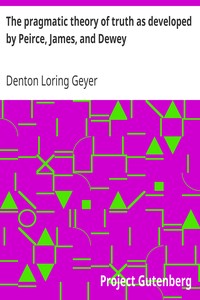The pragmatic theory of truth as developed by Peirce, James, and Dewey by Geyer
"The Pragmatic Theory of Truth as Developed by Peirce, James, and Dewey" by Denton Loring Geyer is a philosophical thesis written in the early 20th century. This work examines the development of the pragmatic theory of truth as articulated by three prominent American philosophers: Charles Sanders Peirce, William James, and John Dewey. Through this discussion, Geyer traces how each philosopher contributed to the evolving understanding of pragmatism, particularly in relation to truth,
belief, and knowledge. The opening of this thesis lays out the purpose and structure of Geyer’s argument, beginning with an examination of Peirce's original notion of pragmatism and its relationship to the meaning of truth. Geyer critiques how Peirce's ideas were interpreted and potentially distorted by some of his followers, notably James and Schiller. He indicates that those interpretations did not fully capture the complexities of Peirce's arguments, leading to significant debates within pragmatic philosophy. The text emphasizes the importance of understanding the specific contributions of each thinker, setting the stage for a detailed analysis of pragmatism’s relationship to concepts of reality and truth as influenced by empirical investigation and individual interpretation. (This is an automatically generated summary.)
Read or download for free
| How to read | Url | Size | |||
|---|---|---|---|---|---|
| Read now! | https://www.gutenberg.org/ebooks/37552.html.images | 206 kB | |||
| EPUB3 (E-readers incl. Send-to-Kindle) | https://www.gutenberg.org/ebooks/37552.epub3.images | 169 kB | |||
| EPUB (older E-readers) | https://www.gutenberg.org/ebooks/37552.epub.images | 167 kB | |||
| EPUB (no images, older E-readers) | https://www.gutenberg.org/ebooks/37552.epub.noimages | 136 kB | |||
| Kindle | https://www.gutenberg.org/ebooks/37552.kf8.images | 393 kB | |||
| older Kindles | https://www.gutenberg.org/ebooks/37552.kindle.images | 378 kB | |||
| Plain Text UTF-8 | https://www.gutenberg.org/ebooks/37552.txt.utf-8 | 165 kB | |||
| Download HTML (zip) | https://www.gutenberg.org/cache/epub/37552/pg37552-h.zip | 158 kB | |||
| There may be more files related to this item. | |||||
Similar Books
About this eBook
| Author | Geyer, Denton Loring, 1884- |
|---|---|
| Title | The pragmatic theory of truth as developed by Peirce, James, and Dewey |
| Credits |
Produced by Adrian Mastronardi, Barbara Tozier and the Online Distributed Proofreading Team at https://www.pgdp.net (This file was produced from images generously made available by The Internet Archive/Canadian Libraries) |
| Reading Level | Reading ease score: 60.8 (8th & 9th grade). Neither easy nor difficult to read. |
| Language | English |
| LoC Class | B: Philosophy, Psychology, Religion |
| Subject | Pragmatism |
| Subject | James, William, 1842-1910 |
| Subject | Peirce, Charles S. (Charles Sanders), 1839-1914 |
| Subject | Dewey, John, 1859-1952 |
| Category | Text |
| EBook-No. | 37552 |
| Release Date | Sep 28, 2011 |
| Most Recently Updated | Jan 8, 2021 |
| Copyright Status | Public domain in the USA. |
| Downloads | 365 downloads in the last 30 days. |
| Project Gutenberg eBooks are always free! | |

